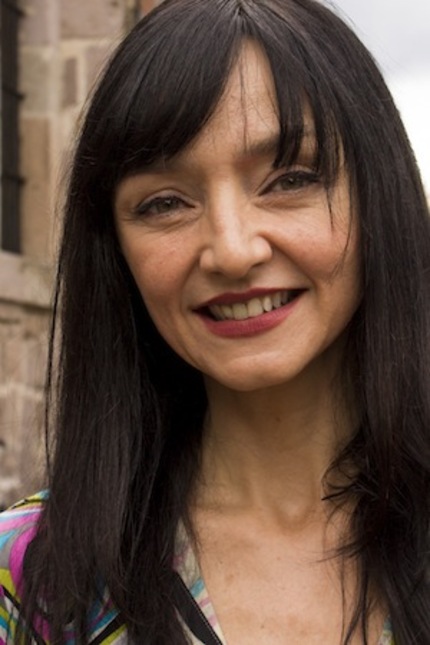Morelia 2013 Interview: Maria de Medeiros Talks Tarantino After 19 Years of PULP FICTION

Maria de Medeiros is in Morelia to present her latest film, the documentary Bacuri's Eyes (original title: Repare Bem). She's also part of the jury for the Mexican feature length film official selection.
Bacuri's Eyes screened at the festival on October 21 (4 PM) and there will be another showing on 25 (6:30 PM), hence it was impossible to watch it before meeting Medeiros. One-on-one interviews were suppose to happen early in the morning on October 21 and I was ready, thinking five or so minutes were enough to talk with her about the origins of Bacuri's Eyes, her favorite films so far from Morelia's selection and, why not, the upcoming 20th anniversary of Quentin Tarantino's Pulp Fiction (Fabienne is arguably her most famous role).
The interviews with Medeiros were ultimately postponed almost three hours. In consequence, I wasn't going to make it to the one and only The Act of Killing screening. It was worthy, I thought, but guess what? Medeiros wanted to watch Joshua Oppenheimer's film as well so every interview was reduced to a couple of questions in order to get in time for The Act of Killing. The result is the brief talk that follows.
ScreenAnarchy: What was the inspiration to work with the Brazilian dictatorship theme on BACURI'S EYES?
Maria de Medeiros: I was contacted by Amnistía commission in Brazil, which is part of the Ministry of Justice. They're doing a very important work and asking forgiveness to the victims of the Brazilian dictatorship. They are helping these persons to rebuild in an administrative and juridical way, to have access to their papers. For example, children who were born during the dictatorship didn't have their real names, didn't know the names of their real parents; they were illegal. It's an important symbolic work.
They contacted me with this proposal of working with this family in specific. Denise Crispim's family has an incredible destiny. It's a very violent story but also with a lot of courage. It's a survival story that unites the European continent with South America because they (Denise and her daughter Eduarda) ran away from Brazil to Chile, where (Salvador) Allende was protecting the exiled before the Pinochet coup d'état. They had to leave Chile and moved to Europe, staying for 40 years in Italy. Now with this process they are rediscovering their own country.
I'm also European but I love Latin American so maybe that's why they hired me, or because I made April Captains, my first feature film about the Portuguese Carnation Revolution. I'm extremely happy! I worked with this story but also met these incredible women.
PULP FICTION is turning 20 next year. Any comments on that?
Yes! My god, it was 20 years ago.
I think Quentin (Tarantino) has only made fantastic movies since then. He's a director that continues with an amazing creativity, surprising us and never repeating himself.
He's more humanist. He loves the human being and while the violence in his films is always discussed, I think he loves his characters and when something happens to them we suffer more. He's a humanist director.
(Photo by Claudia Aguilar Guarneros for Twitch)







